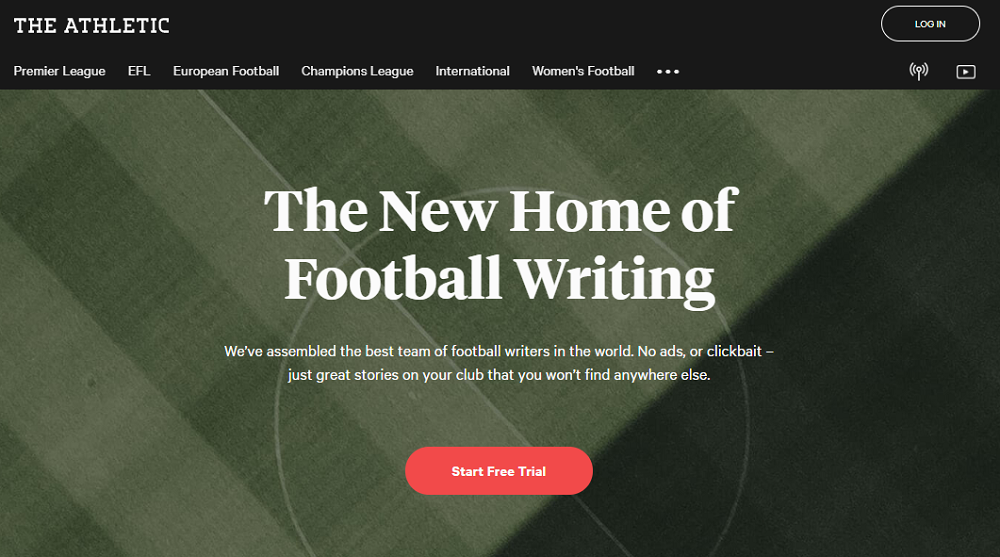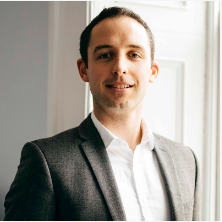By
PADDY O’DEA
 The Athletic’ s founders Adam Hansmann and Alex Mather.
The Athletic’ s founders Adam Hansmann and Alex Mather.
In what was a relatively quiet Premier League transfer window, many British sports journalists found themselves in the rarefied position of being the news, rather than merely its authors.
Two weeks ago, US subscription sports website The Athletic launched its UK edition with the announcement of a new team of high-profile journalists poached from some of the UK’s leading broadsheets.
The Athletic’s business model is an aggressive and potentially very successful one. By hiring some of the best football writers in the UK and Ireland and giving them free rein to write quality journalism on their chosen Premier League clubs, it hopes to take their most dedicated, discerning readers with them.
The Athletic’s UK launch has sent ripples through Fleet Street and beyond, promising a brave new age for football writers and their devoted consumers. The column inches tell a tale of two young tech entrepreneurs, backed by some of Silicon Valley’s leading VCs, setting their sights on disrupting sports media and replicating the successes of Netflix and Spotify’s subscription models in the process. In doing so, they seek to offer a clickbait-free, ad-free product to their readers.
Amid all the launch publicity, however, a 2017 interview given by Athletic co-founder Alex Mather has loomed large over much of the coverage.
“Sucking newspapers dry”
Speaking to the The New York Times in an article titled “Why The Athletic wants to pillage newspapers”, Mather claimed:
“We will wait every local paper out and let them continuously bleed until we are the last ones standing… We will suck them dry of their best talent at every moment. We will make business extremely difficult for them.”
While this “tech bro”, vulture-like language and empire-building attitude might be well received in Silicon Valley, it was never going to play well with the media or many of their prospective readers.
Mather is not the first tech entrepreneur to see his energy and ambition for a new product or innovation manifest as arrogance (one only has to look to Uber for lessons on this front). Disrupter brands by their nature tend to be bullish in tone; their whole DNA is built on overthrowing the establishment and challenging norms. However, unless these headlines deliver new customers, they’re of little value.
Recognising as much, Mather, one bungled public apology aside, quickly pulled back from talking to media and has remained largely silent ever since.
Two years on, this interview continues to hurt The Athletic brand on two fronts.
First, journalists don’t actually want to see the competition fail—quite the opposite, in fact. Most want to see a well-resourced and vibrant newspaper industry. Yes, The Athletic has to date been successful in recruiting some of the UK’s leading football journalists, but one would speculate that the New York Times interview made the headhunting process significantly more challenging.
Secondly, for the same reasons these soundbites jar with many journalists, so too will they fester with many prospective subscribers. In Ireland and the UK, most subscription-based online sports media are driven at least in part by the goodwill of their audiences (The Guardian, The Blizzard, The42.ie, Second Captains) as opposed to market supply and demand.
 The Athletic promises tech-powered, expert-driven football journalism.
The Athletic promises tech-powered, expert-driven football journalism.
Rewinding the clock
Tone matters. We as readers want to support our favourite media titles; in doing so, we feel like we’re part of a grassroots movement or community. Making an already rich VC even richer is a less compelling call to action.
So, given that the interview (and subsequent ill-advised apology) was already out in the public domain, what could The Athletic have done differently ahead of its UK market launch?
Given the hype and anticipation surrounding The Athletic’s arrival on UK shores, media were naturally keen to learn more about the new kids on the block and their ambitious business plan. Typically, it is the role of the CEO or founder to tell this brand story and define its business narrative.
Yes, the New York Times interview would inevitably feature, but by addressing the interview at the outset, Mather would have been able to answer the difficult questions and acknowledge the mistakes of the past, particularly when these mistakes were potentially attributable to misguided exuberance and inexperience.
From there, Mather could have reframed the company’s ambitions for the UK market and laid the groundwork for a new mutually beneficial relationship with the UK’s discerning football audiences.
Obviously, this wouldn’t have made the New York Times interview go away, but it would have certainly helped dilute its prominence in any subsequent coverage and move the Athletic story onto a more forward-looking and relatable footing.
Humble pie
In just over a fortnight, The Athletic has already made a big splash in the very tribal world of British football and its media.
Its remarkable growth in the US, coupled with the success of smaller Patreon-style sports media in the UK and Ireland, suggests there is a growing willingness to pay for and support high-quality sports journalism. Additionally, any movement away from the grips of clickbait headlines should be welcomed by journalists and readers alike.
However, for The Athletic, its biggest challenge in winning over prospective subscribers will be overcoming its ill-fitting tech bro tone of voice in the UK market. Its UK editor and newly assembled roster of leading football journalists obviously have a key role to play in this, but they can only do so much.
Ultimately, The Athletic’s two founders will have to re-engage with media, eat some humble pie, and work towards fostering a new brand tone of voice more palatable to the discerning Premier League football fan. Until they do, The Athletic and its founders will continue to be defined, rightly or wrongly, by one very damaging interview.
PADDY O’DEA
Paddy is a Client Director at PR360. He helps clients create engaging corporate stories, cut through the noise, and advance their business objectives. He is most happy when buried under a pile of newsprint.

